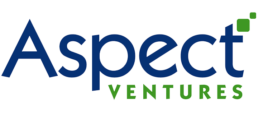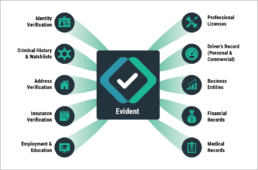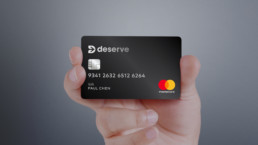Evident Raises $20 Million for Secure, AI-Powered Identity Verification
The financing will allow Evident to respond to demand for its platform, which uses artificial intelligence (AI), machine learning, facial recognition, and end-to-end cryptography to meet customers’ increasingly strict privacy requirements
ATLANTA–(BUSINESS WIRE)–Evident ID, Inc., the revolutionary platform that powers identity and credential verification for many of the world’s fastest-growing companies, has raised $20 million in a Series B financing led by Aspect Ventures; with participation from existing investors New Enterprise Associates (NEA) and Internet Security Systems founder Tom Noonan; as well as new investor Blue Cloud Ventures. The financing will enable Evident to broaden its existing, robust technical infrastructure including deepening its investment in AI and machine learning, computer vision, and facial recognition technologies. Evident will also expand its team to meet the explosive demand for identity verification as enterprises increasingly rely on efficient, remote onboarding.
Evident’s 300% YoY customer growth and comprehensive identity verification solution were key drivers for investor participation. Unlike existing solutions, Evident verifies identity holistically, encompassing both online and offline factors such as business licenses, biometrics, insurance, criminal history, and more. The platform allows businesses to easily implement step-up and continuous identity verification techniques, a key consideration given the increasing amount of fraudulent activity online. Evident enables companies to confidently know who they are registering, hiring, onboarding or verifying for a wide variety of applications while leveraging end-to-end cryptography and machine learning to meet increasingly strict privacy requirements.
“Increasing data privacy regulation, data breaches, and online-offline interactions facilitated via the internet require companies to become arbiters of trust. To reliably fulfill that role, they are seeking solutions to verify personal information for their stakeholders without having to handle personal data themselves,” said Lauren Kolodny, Partner at Aspect Ventures. “Evident is helping businesses verify identity and a wide range of credentials with less friction today – and they’re on the way to building the identity platform for the internet.”
“Evident is solving the most complex identification problems for high-volume businesses with sensitive applications by verifying millions of attributes in a secure and efficient way,” said David Thomas, CEO of Evident. “With this new infusion of capital, we can scale to meet the increasing demands of current customers and marketplaces, as well as continue to grow in additional markets and industries including insurance, healthcare and financial services.”
“Identity verification has never been more important, especially as businesses consider the conflict of mitigating fraud while prioritizing growth and streamlined user experiences,” said Vanessa Larco, Partner at NEA. “Evident is solving these crucial challenges while maintaining the highest standards of privacy and security. Their ongoing market penetration combined with the strength and extensibility of their platform addresses key issues that all businesses are trying to solve.”
About Evident
Evident is revolutionizing the way personal data is shared. Evident’s simple, secure Identity Assurance Platform lets businesses confidently know who they are dealing with without handling sensitive personal data. With connections to thousands of authoritative sources through a single API, Evident is the only platform that enables comprehensive, accurate, and up-to-date identity and credential verifications without the risk and liability of holding personal information. For more information, visit www.evidentid.com.
Contacts
Eva Dudzik
eva.dudzik@hotwireglobal.com
908-642-8581
Aspect co-founder Theresia Gouw named to Marie Claire's 6th annual New Guard list
It’s been declared the Year of the Woman for so many years running, it’s about time to acknowledge what we already know: We’re challenging paradigms, upending business as usual, and building a new world order. Not just this year, but from now on.
At Marie Claire, we make it our mission to celebrate women’s triumphs every day, and for our 6th annual New Guard list, we're highlighting the 50 women who really owned 2018. They're disrupting billion-dollar industries (like Bumble’s Whitney Wolfe Herd and Glossier’s Emily Weiss), founding billion-dollar companies (including Adi Tatarko of Houzz and Anne Wojcicki of 23andMe), taking them public (see: Eventbrite’s Julia Hartz and Stitch Fix’s Katrina Lake), and of course, running them (congrats Susan Wojcicki of YouTube and Sukhinder Singh Cassidy of StubHub). Women are also changing the stories we tell (yes, Shonda Rhimes and Ava Duvernay) and how we tell them (a round of applause for Netflix’s Cindy Holland and Disney’s Jennifer Lee).
Listed in alphabetical order—because they’re all on top!—these 50 disrupters, creators, and innovators are seriously leading the charge. We promise by the time you finish scrolling, you’ll feel inspired, empowered, and ready to join them as they shake up the status quo.
Theresia Gouw
An early investment in Facebook helped Gouw’s net worth skyrocket to a reported $500 million, prompting Forbes to proclaim her the richest self-made female venture capitalist in the U.S. this year. What’d she do with the cash? Launched Aspect Ventures—one of the few funds run by two women (Jennifer Fonstad is cofounder)—which closed a $181 million round earlier this year and oversaw its first billion-dollar IPO in cybersecurity startup ForeScout.
The Mom Project, a job site for moms returning to work, nabs $8M from Initialized and more
[Read on TechCrunch]
If you are a mother who has taken a break from full-time employment to raise kids, you may have also experienced the challenge that is jumping back into the working world after your break.
You may find you need more time flexibility; you have been out of the job market for years and so your confidence is knocked; your skills are no longer as relevant as they were before; or you just want to rethink your career; plus many employers — whether they say it or not — seem less interested in you because of all of the above, and no level of burnishing your resume on LinkedIn will help. It can be tough (and I say that from first-hand experience).
Now, Chicago-based startup The Mom Project, a platform specifically built to help female knowledge workers find jobs after pausing to raise kids, has raised a little egg of its own to take on this challenge. It’s picked up a Series A of $8 million that it plans to use to bring its job marketplace to more cities — it’s currently in Chicago, Atlanta and San Francisco — and to expand the kinds of services it offers to make the challenge of juggling work and parenthood easier.
The funding is being led by Grotech Ventures and Initialized Capital, with another new investor, Aspect Ventures, and previous backers Atlanta Seed Company, Engage Ventures, OCA Ventures, BBG Ventures, IrishAngels and Wintrust Financial also participating.
This brings the total raised by The Mom Project to $11 million, and with 75,000 registered moms and 1,000 companies, including Procter & Gamble, BP, Miller Coors and AT&T, the startup claims it’s now the largest platform of its kind in the U.S.
From selling diapers to changing diapers
Allison Robinson, the founder and CEO of The Mom Project, said she came up with the idea for the startup in 2016, when she was on maternity leave from a strategy role at Pampers.
“I started realising a lot about moms before I became one,” she says about her last role before striking out as an entrepreneur. “But what I hadn’t understood until I was on maternity leave myself was that your priorities can change after having a child.” (She’s pictured up above with her son.)
Citing a study she’d seen in the Harvard Business Review that estimated 43 percent of skilled women exit the workforce after having children, Robinson realised there was a gap in the market for those among them who had timed out from returning to their previous roles, but still wanted to make the leap back into working at some point.
And she has a point: Not only do people who decide they want to return to work face all of the usual issues of newly needing more time flexibility, wondering whether their skills are still current enough, general confidence and so on, but the average recruitment process, and job sites overall, do not really have ways to account for any of that very well.
And the gap exists on the employer side of the marketplace, too. Businesses — both large corporates very much in the public eye as well as smaller businesses that are not — are rethinking how they hire and keep good people in the overall competition for talent. (Just this week, the U.K.’s Office of National Statistics said that the number of unfilled positions in the information and communication technology sector rose by 24.3 percent compared to last year in the country, a shortage that’s reflected in other markets.)
Having a diverse workforce — including more women and women from different walks of life — is key not only to helping counteract that, but to contribute to better overall work culture. That’s a fact that many employers have realised independently or have simply been thrown into the spotlight unwittingly and now are trying to repair.
And yet, there haven’t been many opportunities for them to pursue more diverse hiring practices.
LinkedIn recently made a tiny move into exploring diversity in hiring by at least allowing recruiters to search their job candidate results by gender, but this is a far cry from actually addressing the specific predicaments that particular segments of the working population have, and how to help them connect better with employers who might be keen to bring more of them on through recruitment.
In fact, the idea of providing improved job search for knowledge workers in specific cases is actually a very interesting one that shows there is definitely still room for innovation in the world of recruitment: Handshake earlier this year raised $40 million for its own take on this, which is providing a better LinkedIn-style platform to connect minority university graduates with interesting job opportunities at companies keen to make their workforces more diverse.
“Companies have started to realize the value in building a diverse workforce, but we still have a long way to go in achieving equal representation and opportunities,” said Julia Taxin, a partner at Grotech and new Mom Project board member. “Allison and her team have built an incredible marketplace of diverse talent for companies and I look forward to working with The Mom Project to execute on their vision of helping to close the gender gap in the workplace.”
The Mom Project, Robinson said, is tackling the challenges at both ends of the spectrum.
On the employer side, she said there is a lot of educating going on, talking to HR people and getting them to understand the opportunity they could unlock by hiring more parents — which tend to be almost entirely all-women, but sometimes men, too.
“We want to provide more data to these companies,” she said, pointing out that it’s not just a matter of providing a job opportunity, but also giving parents options in areas like childcare, or flexible working schedules. “We want to show them ‘here is where you are doing well, and here is where you are not. Fixes don’t cost a lot of money, but a lot of companies are just not aware.”
“We’ve got 75,000 women on our platform, and currently around 1,000 companies posting jobs,” she said. “The goal is to have 75,000-plus jobs. We want to make sure that all the moms signing up on the platform are getting work.”
“The Mom Project is determined to create a future where women aren’t forced to choose between their families and their careers,” said Alda Leu Dennis, partner at Initialized Capital and new Mom Project board member, in a statement. “There is a huge pool of experienced talent, parents and non-parents, that is sometimes overlooked because companies haven’t created the kind of diverse, flexible workplace culture that attracts and retains them. Initialized wants to be part of making this cultural shift happen.”
On the parent side, not only is it also about making the platform known to people who are considering a return to work, but it’s also about some fundamental, but very important basics, such as giving would-be jobseekers the flexibility to go to interviews. Robinson said that one campaign it’s about to launch, in partnership with Urban Sitter, is to provide free childcare credits to Mom Project jobseekers so that they can get to their interview.
“Sometimes you have to go to an interview with 24 hours’ notice, and lining up a sitter can be stressful,” she said. “We want to alleviate that.”
Parents also know that this isn’t just an issue for the interview: Many towns and regions have what Robinson called “childcare deserts,” where there is a scarcity of affordable options to replace the parent on a more daily basis.
Contract work is king (and queen)
For now, Robinson said that the majority of jobs on the platform are focused on fixed-term employment — that is, not permanent, full-time work.
This is due to a number of reasons. For example, parents coming back to working after a break may be more inclined to ease in with shorter roles and less long-term commitment. And employers are still testing out how this demographic of workers will work out, so to speak. Equally, though, we have seen a huge swing in more general employment trends, where businesses are hiring fixed-term workers rather than full-time employees to account for seasonality and to give themselves more flexibility (not to mention less liability on the benefits front).
While Robinson said that the aim is definitely to bring more full-time job opportunities to the platform over time, this has nonetheless presented an interesting business opportunity to The Mom Project. The startup acts like Airbnb, Amazon and a number of other marketplaces, where it not only connects job-seekers and employers, but also then handles all the transactions around the job. When the job is fixed-term, the Mom Project essentially becomes like the job agency paying the employee, and that is how it makes a cut. And it also becomes the provider of benefits and more.
In other words, while there is an immediate opportunity for The Mom Project to compete against (or at least win some business from) the likes of LinkedIn to target the specific opportunity of providing jobs for women returning to work, there is a potentially and equally big one in becoming a one-stop employment shop to handle customers’ other needs as employers or workers, providing a range of other services, from payroll through to childcare listings and more.
Deserve named the best student credit card in 2018 by Time's MONEY magazine
[Read on Money]
It turns out 2018 is a great time to be in the market for a new credit card. Sure, interest rates may be on the rise, but with the booming economy Americans are also spending more. That means the competition for borrowers is fierce and issuers are offering plenty of cards with consumer-friendly terms.
“Banks have still been aggressive,” says Brian Karimzad, co-founder of MagnifyMoney. “If you have a big purchase or have a balance you think is pretty close to getting paid off, there are still opportunities to save on interest.”
Beyond that, the best credit card offers today encompass an ever-expanding world out there of perks, points and credits. The trick is figuring out which combination adds up to the best credit card for you.
To do this, think about how you want to use your new credit card to figure out which features will give you the most bang for your buck, Karimzad advises. Are you trying to build credit, for yourself or your business? Do you want to rack up lots of rewards, or get perks like airline lounge access? Or are you trying to borrow strategically, either to pay down debt or make a big purchase? The best travel credit card isn’t necessarily the best rewards credit card, and neither of those would be the best credit card if you’re looking for a low APR to make a big purchase or transfer a balance.
You’ll have the greatest number of choices — and be eligible for the cards with the most tantalizing perks — if your credit is good, but there’s a card out there for everyone — and responsible use of credit is the best way to improve your credit score and your access to the cards with the most generous terms.
Whatever your reason for getting a new credit card, MONEY and MagnifyMoney have sifted through hundreds of cards to find the best in nine different categories. Here are the best credit cards of 2018, the cards that will deal a winning hand to your finances.
All credit card terms are as of Aug. 28, 2018
The Best for Students






